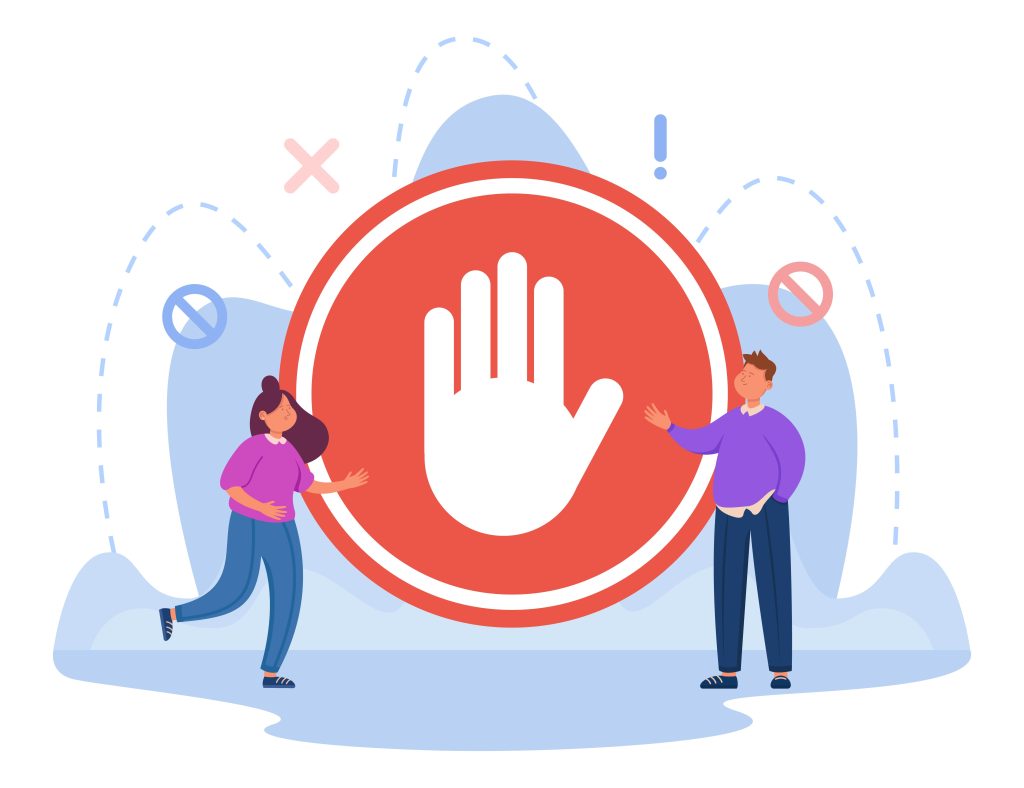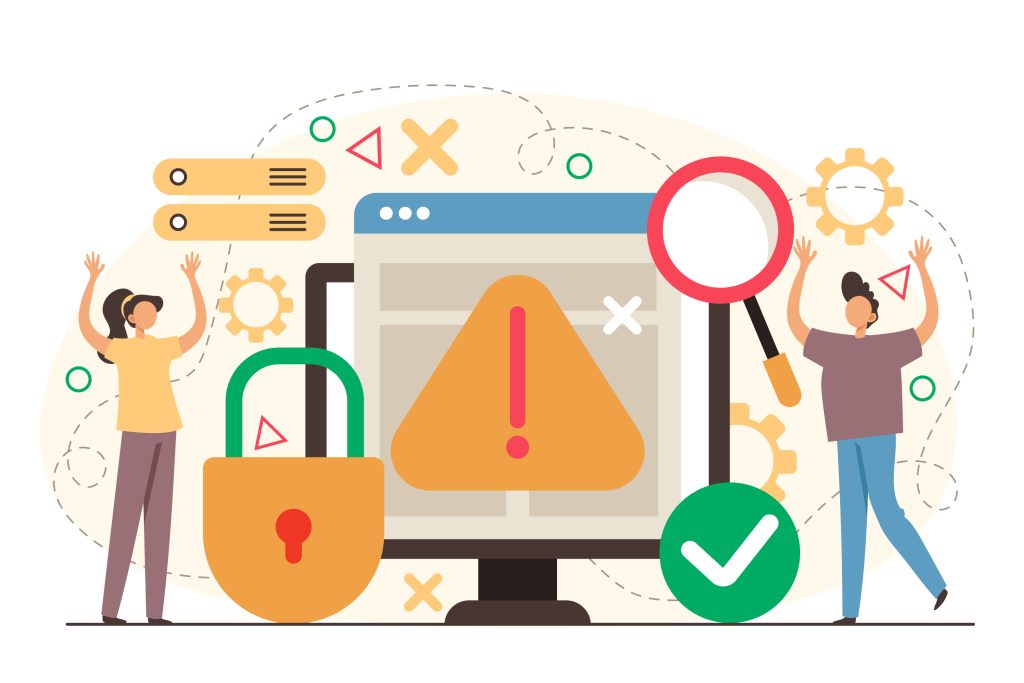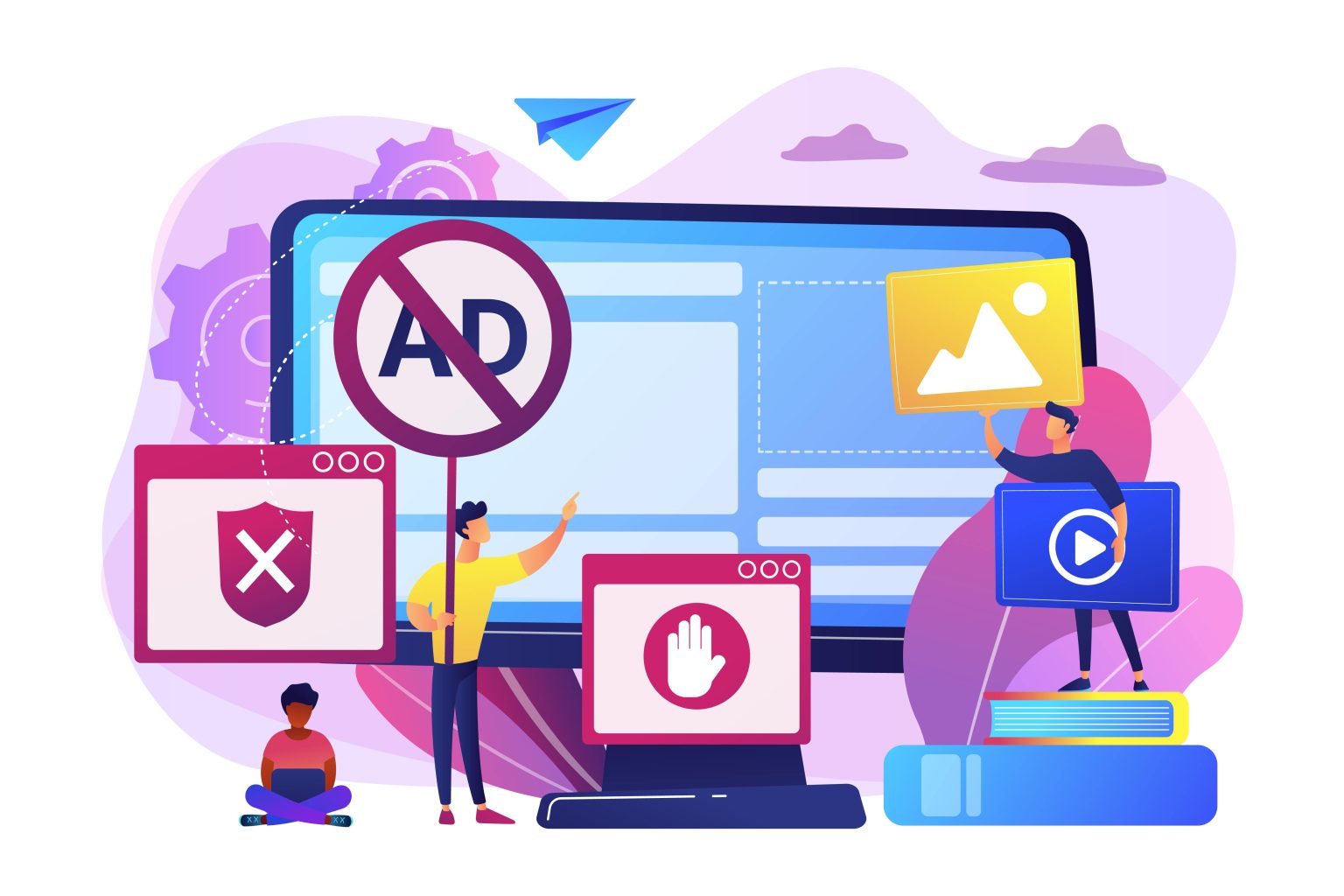Adblockers are software tools or browser extensions that selectively filter out advertisements on web pages. These tools enhance user experience by removing distracting and intrusive ads, such as banners, pop-ups, and video ads, leading to faster page loading times and a cleaner browsing interface. Adblockers also contribute to user privacy by blocking trackers within ads that monitor online behavior, reducing exposure to ad-based malware. Their role extends beyond ad removal, serving as a privacy shield in the digital landscape.
Tips to Use Adblocker Effectively

1. Choose the Right Adblocker
Research and select an ad blocker that best suits your needs. Some are more comprehensive than others, and certain ad blockers might be better suited for your specific browser or device.
2. Keep It Updated
Regularly update your adblocker to ensure it can handle the latest types of ads and tracking methods. Adblocker developers frequently update their filters and algorithms to stay ahead of new advertising technologies.
3. Customize Your Filtering
Many adblockers allow you to customize what gets blocked and what doesn’t. Take advantage of these settings to tailor your browsing experience. For example, you can choose to block all ads or allow non-intrusive ads.
4. Whitelist Trusted Sites
Support your favorite websites by whitelisting them. This means allowing ads to be displayed on these sites. Many content creators depend on ad revenue, so consider allowing ads on sites you trust and want to support.
5. Use with Other Privacy Tools
Complement your adblocker with other privacy tools, like anti-tracking extensions and a VPN, for a more comprehensive privacy solution. Adblockers mainly focus on ads and might not block other types of trackers.
6. Be Aware of Acceptable Ads
Some adblockers have programs that allow certain ads to pass through their filters (often called “Acceptable Ads”). Understand how these programs work and how to opt out if you prefer not to see any ads.
7. Regularly Check for Malfunctioning Websites
The ad blockers can break site functionality or layout. If a website isn’t working properly, try disabling your adblocker to see if it resolves the issue.
8. Stay Informed About Updates and Changes
Follow news or updates from your adblocker’s developers to stay informed about new features, changes, or issues. This can help you use the tool more effectively.
9. Review and Adjust Settings Periodically
Your browsing needs may change over time, so it’s a good idea to review and adjust your adblocker settings periodically to ensure they still align with your preferences.
10. Understand the Types of Ads Blocked
Different ad blockers may target different types of ads. Familiarize yourself with what your adblocker targets, whether it’s pop-ups, banner ads, video ads, or all forms.
11. Consider Mobile Devices
If you frequently browse on a mobile device, ensure your adblocker is effective on mobile browsers, or consider an ad-blocking browser for mobile.
12. Use of Multiple Browsers
If you use more than one browser, consider installing your adblocker on each one to maintain a consistent ad-free experience across all your browsing tools.
13. Be Cautious with ‘Free’ Adblockers
Some free adblockers might themselves have privacy issues or allow certain ads through for a fee. Research the adblocker’s policy to ensure it aligns with your privacy standards.
14. Adjust for Video Streaming Services
Some streaming services may have issues with adblockers. Adjust your adblocker settings or disable it temporarily if you experience streaming issues.
15. Balance Between Blocking and Usability
Find a balance in ad blocking that works for you – blocking too much can sometimes hinder web functionality, while blocking too little may not provide the desired ad-free experience.
16. Be Prepared for Anti-Adblocker Messages
Some websites detect adblockers and may prevent access or request you to disable them. Decide on a case-by-case basis whether to disable your ad blocker or seek alternative websites.
17. Monitor Browser Performance
Adblockers can sometimes affect browser performance. If you notice significant slowdowns, check if the adblocker is the cause and adjust settings or switch to a different adblocker if necessary.
Benefits of Using an Adblocker

1. Cleaner Web Page Layout
Adblockers streamline the appearance of websites by eliminating these ads, resulting in a more aesthetically pleasing and reader-friendly layout. This cleaner interface not only makes it easier to find and focus on the content you’re interested in but also enhances the overall visual experience of browsing the internet. The absence of flashing banners and pop-up ads means a more serene and less distracting digital environment.
2. Battery Life Preservation
Many online ads, especially those that are animated or video-based, are resource-intensive and require substantial processing power to display, which in turn drains battery life. By blocking these ads, adblockers reduce the workload on your device’s processor and battery, leading to longer battery life. This is especially crucial for users who rely heavily on their mobile devices throughout the day.
3. Reduced Risk of Clickbait
Clickbait ads, known for their sensational and often misleading headlines, are designed to attract clicks but typically lead to low-quality or irrelevant content. Adblockers minimize exposure to these types of ads, reducing the temptation to click on something that looks intriguing but ends up being disappointing or deceptive. This protection not only saves time but also helps in maintaining a more trustworthy and quality-focused online experience.
4. Supporting User Choice
With the ability to block unwanted ads, users can tailor their online environment to suit their preferences. This means having the choice to view websites without interruption, distraction, or the influence of aggressive advertising. It’s about respecting the user’s autonomy and preferences in an online world that is often dominated by commercial interests.
5. Decreased Mental Clutter
Adblockers reduce cognitive load. By removing the constant stream of advertising, these tools allow users to focus better on the content that matters, leading to a more relaxed and mentally unburdened online experience. This reduction in mental clutter is not only beneficial for productivity but also for overall digital well-being.
6. Reduced Risk of Inappropriate Content
The digital landscape often exposes users to ads containing adult or inappropriate content, which can be particularly concerning for young users or those seeking a professional environment. Adblockers effectively filter out such content, ensuring that the advertisements displayed do not contain objectionable or sensitive material. This creates a safer, more family-friendly online experience, aligning the web with individual standards of appropriateness and comfort.
7. Minimized Distraction During Video Streaming
Video streaming can often be interrupted by frequent and sometimes lengthy in-video ads, which can be a significant source of annoyance and distraction. Adblockers enhance the video streaming experience by blocking these ads, providing an uninterrupted viewing experience. This is especially appreciated by users who consume a lot of video content and prefer a seamless, ad-free experience.
8. Ease of Navigation on Mobile Devices
On mobile devices, where screen real estate is limited, ads can significantly hinder usability and readability. Adblockers improve the experience of browsing on smaller screens by removing these ads, making it easier to read and navigate content. This is particularly beneficial for websites that are not well-optimized for mobile viewing, ensuring that the user experience remains smooth and uncluttered.
9. Improved Performance on Older Computers
Older computers, which may have limited processing power and memory, can struggle with the demands of modern, ad-heavy websites. Adblockers alleviate this burden by reducing the number of resources (like CPU and RAM) needed to load and display web pages. This leads to better overall performance, less lag, and a more responsive browsing experience on less capable machines.
10. Support for Content Choices
By using adblockers, users can indirectly encourage content creators and website owners to adopt less intrusive advertising methods or to offer ad-free platforms. This can lead to a healthier balance between advertising and content, where users can enjoy high-quality content without being overwhelmed by ads, and creators are incentivized to find more user-friendly ways to monetize their sites.
11. Avoidance of Overwhelming Ad Volume
They significantly reduce the number of ads displayed on web pages, offering a cleaner, less cluttered browsing experience. This not only enhances the visual appeal of websites but also makes navigation and content consumption more enjoyable and less overwhelming, especially on sites that are heavily saturated with advertisements.
12. Decreased Loading Failures
Excessive advertising can sometimes overwhelm a website’s infrastructure, leading to longer loading times or even causing web pages to crash or fail to load properly. Adblockers help mitigate this issue by reducing the number of ads that load on a page, thereby lessening the strain on the website’s resources. This results in a more reliable and stable browsing experience, with fewer interruptions and technical issues attributed to ad overload.
13. Protection Against Misleading Ads
The internet is rife with advertisements that can be deceptive or misleading, sometimes leading to scams or fraudulent websites. Adblockers provide a layer of protection against such ads, filtering them out and thereby reducing the likelihood of encountering potentially harmful content. This protection is particularly important in safeguarding less experienced internet users who might be more vulnerable to these deceptive practices.
14. Enhanced Focus for Research and Reading
When engaged in research or reading online, concentration is key. Adblockers help create a distraction-free environment by eliminating ad interruptions, allowing for better focus and comprehension. This is particularly beneficial for academic research, professional work, or leisure reading, where maintaining a high level of concentration is essential for absorbing and processing information effectively.
15. Customizable Web Experience
Users can tailor their ad-blocking preferences to suit their needs, choosing to block all ads or only specific types. This personalization allows users to have control over their online environment, deciding how they interact with web content and to what extent they are exposed to advertising, making their internet experience more aligned with their personal preferences and needs.
16. Improved Browsing Speed
By blocking ads, especially those rich in graphics and animations, these tools prevent unnecessary bandwidth usage, ensuring that web pages load more swiftly. This enhancement is particularly significant on websites laden with heavy, media-rich advertisements. The result is a smoother, more efficient online experience, where information and content become readily accessible without the delay caused by loading numerous ads.
17. Enhanced Privacy
Many ads contain trackers that monitor your browsing habits, gathering data about your online behavior, preferences, and sometimes even personal information. By blocking these ads and their embedded trackers, adblockers help maintain the confidentiality of your online activities. This reduces your digital footprint and minimizes the risk of your data being exploited for targeted advertising or more malicious purposes.
18. Reduced Data Consumption
For individuals with limited data plans, adblockers are a blessing. Ads, particularly video and interactive ads, consume a significant amount of data. By preventing these ads from loading, adblockers help conserve data, which is especially beneficial when using mobile devices. This conservation of data not only helps in avoiding overage charges but also ensures that essential online activities can continue without being hindered by data limit concerns.
Disadvantages of Using Adblocker On Your Device

1. Reduced Revenue for Websites
This reduction in advertising revenue can have profound implications, potentially leading to the downsizing of content, diminished website quality, or even the closure of sites entirely. It challenges the conventional internet model where free access is offset by ad revenue, forcing content providers to explore alternative funding methods that may not be as accessible or beneficial for the average user.
2. Ethical Considerations
Employing adblockers sparks a moral debate about the fairness of accessing and benefiting from online content without contributing to its financial support. This is particularly pronounced for smaller websites and independent creators who rely heavily on ad revenue. It raises questions about the sustainability of free content and the responsibility of users in supporting the digital economy, especially when enjoying the fruits of someone else’s labor without contributing to their income.
3. Blocking Useful or Relevant Ads
Adblockers, while filtering out intrusive ads, can also inadvertently block advertisements that might be of interest or use to the user. These could include promotions for products, services, or events that align with the user’s interests. This overzealous blocking not only deprives users of potentially beneficial information but can also hinder the effectiveness of targeted advertising, a key tool used by businesses to reach their relevant audience.
4. Compatibility Issues
Adblockers might not be fully compatible with all websites, which can lead to unintended consequences such as broken web pages or diminished site functionality. This incompatibility can degrade the user experience, leading to improperly loaded pages, missing content, or even the inability to access certain site features. Users might find themselves having to disable adblockers to properly interact with some websites, thereby negating the very purpose of having an adblocker.
5. Over-blocking Ads
Over-blocking is an issue where adblockers filter out content that is not advertising, such as important text, images, or even entire web pages. This can result in missing crucial information or misrepresenting the intended content of a website. For instance, educational, news, and informational sites may have their material inadvertently censored or obscured, leading to an incomplete or confusing user experience. This overzealous blocking can undermine the utility and reliability of adblockers, posing challenges for users in accessing comprehensive and accurate online information.
6. Increase in Paid Subscriptions
The decline in ad revenues due to ad blockers could push more websites towards subscription-based models. This shift would fundamentally change how content is accessed online. While subscriptions can provide a steady revenue stream for content creators, they also limit access to those willing or able to pay. This could lead to a digital divide where high-quality content is locked behind paywalls, reducing the wealth of freely available information and resources that has been a hallmark of the internet.
7. Negative Impact on Small Businesses
Small businesses often rely on online advertising as an affordable and effective way to reach potential customers. Adblockers significantly reduce the visibility of these ads, impacting the ability of these businesses to attract new customers and grow. This can be particularly challenging for new or small-scale enterprises that do not have the budget for more expensive or diverse marketing strategies.
8. Complications in Web Development
Web developers must design websites in a way that can gracefully handle the absence of ads, ensuring that content and layout are not adversely affected. This requires extra planning and testing, adding complexity to the web development process. Developers must strike a balance between accommodating ad blockers and providing spaces for ads that fund the website.
9. Reduced Effectiveness of Online Campaigns
Adblockers diminish the reach and effectiveness of online advertising campaigns. For businesses and organizations that rely on digital ads to promote products, services, or initiatives, adblockers can result in reduced campaign visibility and engagement. This decrease in effectiveness can lead to higher marketing costs and lower returns on investment, affecting the overall strategy and success of online marketing efforts.
10. Hindrance to Market Research
Advertisements often serve as tools for gathering valuable consumer insights, preferences, and behaviors. By blocking these ads, adblockers restrict the flow of this essential data, making it challenging for businesses to understand their target audience and market trends. This limitation can affect product development, marketing strategies, and overall business decisions, leading to less informed and potentially less successful market approaches.
11. Difficulty in Content Personalization
Personalization of content and ads based on user behavior is a key aspect of the modern web experience. Adblockers, by preventing the collection of user data through ads, hinder this personalization process. Users might miss out on tailored experiences, such as recommendations aligned with their interests or personalized advertising that is more relevant and less intrusive. This lack of personalization can lead to a more generic and less engaging online experience.
12. The barrier to New Website Discovery
Adblockers can limit this exposure, as they prevent these potentially beneficial ads from reaching the user. This reduction in exposure can narrow the scope of online discovery, potentially causing users to miss out on discovering new interests, information sources, or opportunities.
13. Undermining the Free Internet Model
The prevalent use of adblockers poses a challenge to the traditional model of the internet, where free content is supported by advertising revenue. This model has enabled a vast array of free online services and content. As adblockers diminish ad revenues, content providers may be compelled to seek alternative funding models, such as subscriptions, which could limit the accessibility of free content and alter the fundamental nature of the internet.
14. Blocking Non-Profit Ads
Adblockers do not discriminate between commercial and non-profit advertisements, which means they can inadvertently block ads from non-profit organizations. These organizations often rely on online advertising for awareness campaigns, fundraising, and other crucial activities. By blocking these ads, adblockers can hinder the ability of non-profits to reach potential supporters and benefactors, impacting their overall effectiveness and mission.
15. False Sense of Security
While adblockers block many types of ads and trackers, they are not solutions for online privacy and security. Users might mistakenly believe they are fully protected from all forms of online threats, including sophisticated tracking and malware, which is not the case. This misconception can lead to complacency in adopting other essential security measures, such as using strong passwords, updating software, and being cautious with email attachments and suspicious websites.
16. Maintenance and Updates
This requires regular updates and maintenance, which, if not performed, can result in decreased effectiveness. Users need to stay vigilant about keeping their adblockers up-to-date to ensure they continue to block the latest ad formats and tracking methods. This ongoing need for updates can be a hassle for some users and might lead to lapses in protection.
17. Impact on Site Analytics
The widespread use of adblockers can significantly skew website analytics, which is crucial for site owners to understand their audience, tailor content, and improve user experience. When adblockers prevent tracking scripts from executing, it can lead to underreporting of site visits and user behavior. This distortion in analytics data can impact decision-making for website improvements, advertising strategies, and content creation.
18. Dependency and Control
Relying heavily on adblockers can inadvertently diminish a user’s ability to navigate the internet safely and effectively without such tools. This dependency might hinder the development of critical digital literacy skills, such as identifying and avoiding malicious sites or understanding the nuances of online privacy. Users may become less adept at managing their online experience independently, leaning on adblockers to navigate the web safely.
19. Blocking Emergency Announcements
In some cases, adblockers can unintentionally block important public service announcements or emergency alerts that are disseminated through advertising channels. This could lead to users missing out on critical information, especially during times of crisis or public health emergencies. While the intention is to block unwanted ads, the inadvertent filtering of these crucial announcements can have unintended consequences, potentially impacting the well-being and safety of individuals.

